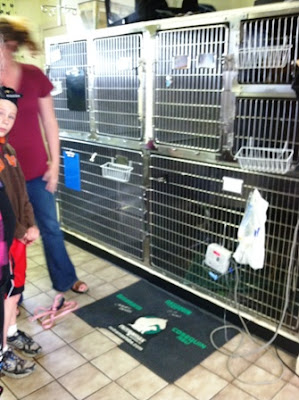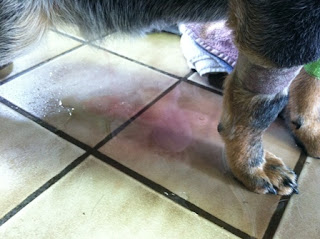Part 4 of the May 2012 Reader's Digest Article, "50 Secrets Your Vet Won't Tell You," by Michelle Crouch.
"Secret's" 16 through 21. This section is titled “What We’re Doing”
Number 16
“Sometimes we do things for free, just because we want to help the pet.” Sandy Willis, DVM, DACVIM, an internal medicine consult in Seattle WA.
I REALLY need to send this woman a card. Is there another vet out there with as weak a heart as me?
Actually on this topic I just talked to Dr. Leasure at VOSM. He is doing a femur fracture repair for one of my clients (I will write Ophelia’s story soon) at a lower cost (Chris please don’t kill me for admitting this), because the client is soo in love with his Ophelia and he wants her leg to be fixed by a professional but he cannot afford the cadillac fix. So Chris's heart, just like mine, and many other vets, is torn between trying to help our patients and clients by providing services more affordably and running a profitably (gasp) vet practice. Often this means some stuff is given away to our clients for “free”. It is hard to run a veterinary clinic as a business (ask my husband). I absolutely cannot run JVC like I would a clothing store. If you couldn’t afford the dress you really wanted I would tell you that I have some other more affordable dresses you could look at but I wouldn’t lower the price. Does anyone go to the grocery store and ask for a “discount”? I get asked for this everyday..(it makes me a little annoyed). I would much rather be told, “hey doc I have limited resources can we start at the conservative side?”
Anyone have any great ideas for me to not get cold hearted, jaded, or bitterly annoyed and not be giving discounts or free services everyday? Yeah, I don’t have any good ideas either.
Number 17
“New staff or training students sometimes practice injections or catheter placements on your pet. If you'd rather not allow your pet to be used in this way, make sure you say something beforehand.” Oscar Chavez, DVM
OK, here’s where my honesty comes shining through. I will tell you that you absolutely need to be at a veterinary hospital where you trust the staff and mission behind the hospitals name plate. It would be unfeasible for us to run a hospital without training our staff. One of the things I take the most pride in at JVC is that EVERY technician at my clinic can place a catheter AND give an injection. Every technician (and veterinarian for that matter) had to learn this. It takes practice. I let my staff practice on my pets and I let them practice and encourage them to practice until they feel confident doing it. BUT, they do not practice on sick pets. And if anyone is having a tough time placing a catheter, which happens to ALL of us, we swap out and let another person try. Asking me to not let your pet be used for training my staff says to me, “I don’t trust your staff." I will reply to you that, “I understand how much you care about your pet, and I will do everything to make sure your pet is treated with the utmost care and concern.” There is no “untrained” staff at my clinic. We are ALL "in-training" everyday. Medicine is a lifelong learning process. (In fact as I write this I am at the CVC Veterinary Conference in Wash DC, learning about all sorts of things. Those blogs to follow).
Number 18
“I’ll let you in on the secret of no-kill shelters: We had a contract with our local Humane Society that stated we’d euthanize the animals in their care that needed to be put down. One Sunday, they sent us 72 cats to put down. By the end, we were all emotionally devastated.” Jessica Stout-Harris.
I know no one wants to hear this. But here is the truth. THERE IS NO SUCH THING AS A NO-KILL SHELTER. Some are much closer than others, but no one is no-kill. If they say they are no kill then they are turning people away at the front gate to preserve their statistics. Which means these pets are instead being dumped at the city/county/public shelters where some of them have kill rates of 90% plus. If you dump your pet, (for whatever reason you think is justifiable) there is a VERY good chance they will be euthanized, and you are responsible for the death of that pet, the blood is on your hands.
There is a terrible problem with pet overpopulation in this country. Pets are a life-long commitment that requires time, patience, emotional and financial responsibility. Please don’t enter into it lightly because the consequences can be devastating.
Number 19
“Behavior issues are the number 1 cause of pet re-homing, euthanasia, and death. Yet because it’s not medical, most of us don’t learn much about it in veterinary school.” Oscar Chavez , DVM
This is a true statement. Behavior medicine has blossomed to become its own specialty in the last decade or so. We have two behaviorists on staff at JVC and they get referrals daily from the rest of our staff. I have seen 3 month old puppies come in for their puppy shots already growling and biting. These guys scare the Dickens out of me. They need immediate intervention. I always recommend puppy classes to my clients, regardless of how many puppies that have had previously. We all need re-fresher parenting classes, and it is a great way to spend some real quality time with your pet and to get them socialized. I have had to euthanize countless pets because of behavior issues. It is the reason JVC has 5 cats, and 2 dogs looking for homes right now.
Number 20
“Your vet may not have gotten into vet school! Vets who can’t get into traditional U.S. veterinary programs due to bad grades and poor test scores often go to for-profit schools in the Caribbean, where, basically, if you can pay the tuition, you can get in.” A vet in Cal.
This is the first question I was asked when the client came in the other day to interview me. I was a little blown away. It is true there are many vet schools setting up outside of the United States. These schools market themselves as being "available to anyone who wants to be a vet." The criteria to get in to them is much different than the U.S. schools. I have seen both very poor veterinarians and exceptional vets come out of these "abroad" chools. Because of this I cannot say that you should cast a disapproving eye on them. Vet school, and the life you lead after it, are what separate the good from the bad vets, and even that is in the eye of the beholder. I went to Virginia-Maryland Regional college of Veterinary Medicine in Blacksburg, VA and I do believe I received a first rate education. But it was very hard to get into. If I had a more difficult time, and if I could have afforded it, (which I don’t think I ever could have) I probably would have gone abroad. I was that determined to go.
Oh, here’s a question for you? I have often wondered if “anonymous” is synonymous with “cowardly”? I think if you believe something enough to say it and have it published you should stand behind it. We are all entitled to our opinions but are we all to afraid to voice them?
And, for the record, as my interviewer was told, "all of the vets at JVC went to U.S. schools."
Number 21
“No regulation says vets have to check certain lists before they euthanize an animal, and lots of vets still do convenience euthanasia for owners who prefer the easy way out. We see a lot of euthanasia in November and December, for example, just because people are getting ready for the holidays. I refuse to do it.” Oscar Chavez, DVM
This is another sad but true statement. I have also been faced with these clients. But the discussion needs to be pursued a little further.
What is going to happen to that pet if I don’t euthanize it?
Where is it going to go?
What is going to happen to it?
Before I flat out refuse to euthanize a pet that the owner clearly doesn’t want anymore I need to think about that pet. I have heard owners tell me “that if I don’t do it they will find someone who will!” Also a true statement. Or even worse I have had owners tell me, “if you don’t euthanize her now I will take her home and shoot her.” To that I respond, "that “shooting your pet is not a legal acceptable form of euthanasia and it is reportable and punishable by law.” Which always makes me feel a little better to say, but doesn’t make anything better for that pet.
I also know that if that pet is brought to the shelter the shelter staff (who are for the most part untrained, and definitely NOT veterinarians), will have to do it. As much as I am angered by the situation when it arises it isn’t right to send a pet to be killed by people who aren't trained and don't have sedation, etc. readily at their disposal. At least in my hands I can sedate the pet and make it a gentle stress-free event where the pet is told that someone is sorry, loves them, and that are a "good girl."
After that explanation it makes it sound like I do perfom these “convenience" euthanasia’s, which, in reality, I also refuse to do. If there is anyway I think I can treat this pet, or re-home it, I will not euthanize it. And if there is any way I can work with an owner to treat a pet I will talk until I am blue, and then resort to begging.
For assistance with any behavioral problems go to your vet and ask for help. If they are not trained in behavior ask for a referral. Please be careful if you are searching for a behaviorist on the internet. There are a HUGE number of people proclaiming themselves to be “experts” because they are big fans of Cesar Milan, and “have watched every episode”. Behavior modification needs a lot of time, patience and dedication, and absolutely no hard, harsh, mean or abusive treatment on your part. Sometimes it also needs medication to treat. This can only come from a licensed veterinarian.
If you would like to make an appointment with one of our staff behaviorists, or if you want to meet our staff, or our pets, please visit www.jarrettsvillevet.com
More “secrets” to follow…stay tuned.
































































